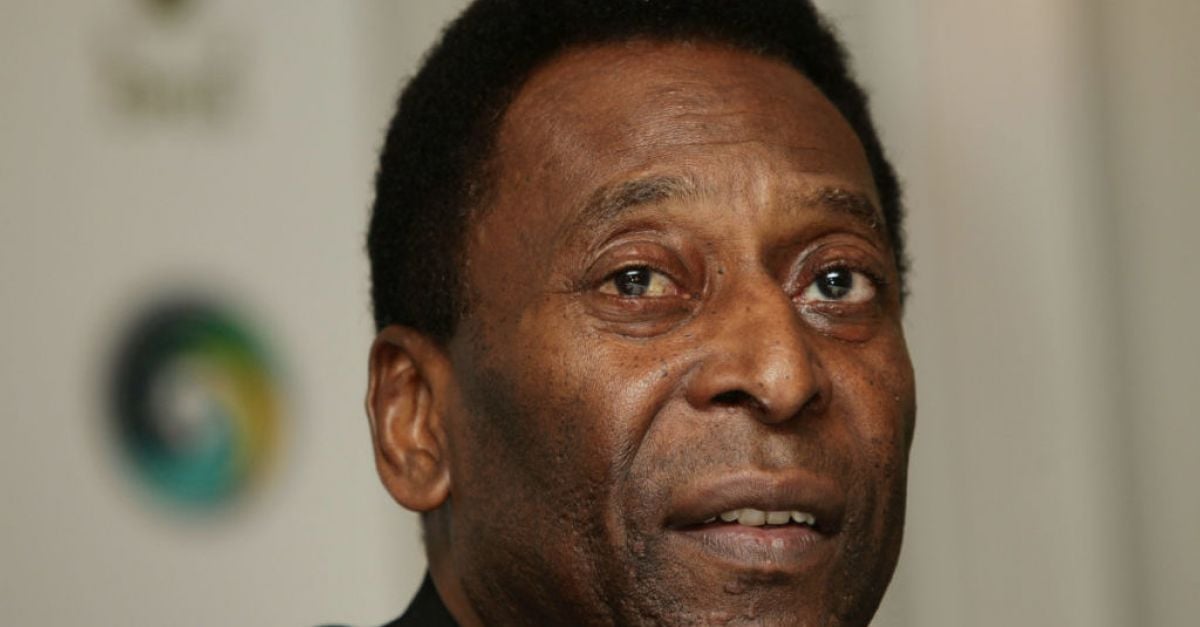
Brazil great Pelé has died at the age of 82.
The three-time World Cup winner had been in hospital in São Paulo since late November.
Pele’s daughter Kely Nascimento wrote on Instagram: “We are thanks to you. We love you infinitely. Rest in peace.”
A inspiração e o amor marcaram a jornada de Rei Pelé, que faleceu no dia de hoje.
Amor, amor e amor, para sempre.
.
Inspiration and love marked the journey of King Pelé, who peacefully passed away today.Love, love and love, forever. pic.twitter.com/CP9syIdL3i
— Pelé (@Pele) December 29, 2022
Nascimento, who had posted before Christmas that members of Pelé’s family would spend the holiday period in the hospital with him, added three heartbroken emojis.
Pelé burst on to the global scene as a 17-year-old at the 1958 World Cup, helping Brazil to the first of their record five successes in the competition.
Advertisement
Injury affected his contribution to the finals in 1962, when Brazil retained their title, and 1966, but he returned to lead his country to glory for a third time in Mexico in 1970, as part of what is widely regarded as the greatest line-up of all time.
He has endured a number of health issues in recent years, and in September 2021 underwent surgery to remove a tumour from his colon.
? #OnThisDay in 1958, a 17-year-old @Pele scored his first #WorldCup goal in Brazil’s quarter-final victory over Wales
? What a goal it was! pic.twitter.com/lIhiTQgmZT
— FIFA World Cup (@FIFAWorldCup) June 19, 2021
This year, he was admitted to the Hospital Israelita Albert Einstein in São Paulo on November 29th with a respiratory infection and remained there until his death.
He was a prodigious scorer of goals, and is credited with 1,281 of them across the length of his career by the official FIFA website.
There was so much more to his game though, and his outrageous talent and willingness to try – and often pull off – the seemingly impossible have prompted many observers to describe him as the greatest player of all time.
Others can also justifiably stake a claim for that title – not least Diego Maradona and his fellow Argentinian Lionel Messi – but it is inconceivable not to mention Pelé in any shortlist.
Advertisement
Eterno. pic.twitter.com/N912VpCmVK
— Santos FC (@SantosFC) December 29, 2022
He was born Edson Arantes do Nascimento in the Brazilian state of Minas Gerais. His father, Dondinho, was a professional footballer.
He first had trials at Santos in June 1956, and his scoring exploits for the club in the São Paulo state championship propelled him into the Brazil squad for the 1958 World Cup in Sweden.
Alongside other stars like Garrincha, Mario Zagallo and Didi, Brazil laid to rest the disappointment of losing the 1950 World Cup final on home soil to Uruguay, and became the first team to win the tournament outside their home continent.
He quickly became a superstar in his home country of what was at the time a forward-looking nation, and became hugely marketable.
Injury curtailed his involvement in the 1962 World Cup as Brazil retained the trophy in Chile, and the player was criticised for not speaking out against the military coup in Brazil two years later.
Brazil lost their grip on the World Cup in England in 1966. Pelé was exposed to some brutal treatment from defenders, in particular those of Portugal, as the South Americans failed to get out of their group.
Incredibly there was debate in Brazil leading into the 1970 finals about whether Pelé, still only 29, should even be in the squad. He answered his critics in spectacular style as Brazil regained the trophy in Mexico.
Advertisement
He headed Brazil in front in the final against Italy and his languid pass into the path of Carlos Alberto completed a sublime team move for the final goal in a 4-1 win.
He never played for a European club but spent time in the United States with New York Cosmos before his retirement in 1977.











